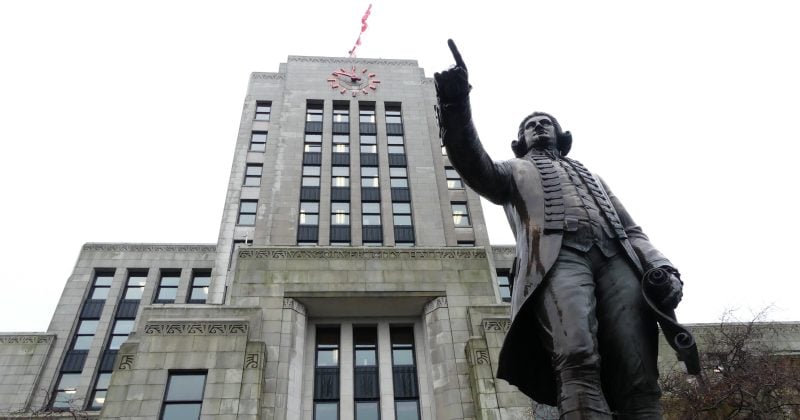Key Takeaways:
I. Bitcoin's decentralized nature and fixed supply offer a potential hedge against inflation, but its volatility requires careful risk management.
II. Integrating Bitcoin into municipal finance presents significant technical and security challenges, demanding robust custody solutions and specialized expertise.
III. Vancouver's decision could influence global regulatory frameworks for Bitcoin and other digital assets, setting a precedent for other municipalities.
The Vancouver City Council is contemplating a bold move: integrating Bitcoin into its reserve asset portfolio. This decision, fueled by Mayor Ken Sim's belief in Bitcoin's potential as a hedge against inflation and currency devaluation, has sparked both excitement and concern. While proponents see Bitcoin as a forward-thinking solution to the challenges of modern finance, critics point to its volatility and the complex regulatory landscape. This article delves into the multifaceted implications of Vancouver's Bitcoin gambit, exploring the macroeconomic backdrop, strategic considerations, regulatory hurdles, and technical complexities of this unprecedented move.
Bitcoin as a Reserve Asset: A Macroeconomic Perspective
The current macroeconomic environment, characterized by persistent inflation, historically low interest rates, and expanding global debt, is challenging the efficacy of traditional reserve asset strategies. Government bonds, once a cornerstone of municipal portfolios, offer diminishing returns, while fiat currencies are susceptible to devaluation. This backdrop of financial instability creates an impetus for exploring alternative assets that can preserve purchasing power and mitigate systemic risks.
Bitcoin, with its fixed supply of 21 million coins, offers a compelling counter-narrative to the inflationary pressures of fiat currencies. Its decentralized nature, operating independently of central banks and government control, provides a degree of insulation from monetary policy manipulations and geopolitical risks. These inherent characteristics position Bitcoin as a potential hedge against the erosion of purchasing power, aligning with Ray Dalio's principles of seeking alternative stores of value during periods of economic instability.
| Asset Class | Growth (%) Q2 2023 - Q2 2024 | Bitcoin Price (USD) | MicroStrategy Holdings (BTC) | Bitcoin Trading Volume (USD) | Stablecoin Market Cap (USD) | Bitcoin-Gold Correlation |
|---|---|---|---|---|---|---|
| Equities | 20.5 | 30000 | 152800 | 20000000000 | 120000000000 | -0.2 |
| Real Estate | 6.0 | 30000 | 152800 | 20000000000 | 120000000000 | -0.2 |
| Treasury Securities | 8.6 | 30000 | 152800 | 20000000000 | 120000000000 | -0.2 |
Furthermore, Bitcoin's growing acceptance within the institutional investment community adds weight to its consideration as a legitimate reserve asset. Companies like MicroStrategy, holding over 331,200 Bitcoin worth more than $32 billion, demonstrate a growing confidence in its long-term value proposition. The increasing flow of funds into Bitcoin spot ETFs and the record-breaking trading volume in Bitcoin-related stocks further underscore its integration into mainstream finance.
However, a balanced perspective requires acknowledging Bitcoin's inherent volatility. While its price has experienced remarkable growth, it is also susceptible to significant fluctuations. Therefore, integrating Bitcoin into a municipal reserve portfolio demands a nuanced understanding of risk management principles, including diversification strategies, dollar-cost averaging, and a long-term investment horizon. Ignoring these considerations would be a disservice to the fiduciary responsibility entrusted to public officials.
Navigating the Bitcoin Landscape: A Practical Guide for Municipalities
Integrating Bitcoin into a municipal reserve portfolio presents both strategic opportunities and practical challenges. From a strategic perspective, Bitcoin's low correlation with traditional assets like stocks and bonds can enhance portfolio diversification, potentially reducing overall risk. However, its volatility requires careful consideration of allocation strategies and risk tolerance. A phased approach, starting with a small allocation and gradually increasing exposure as experience and comfort levels grow, may be prudent.
The technical aspects of Bitcoin management are perhaps the most daunting hurdle for municipalities. Secure custody solutions are paramount, requiring specialized expertise in managing private keys and navigating the complexities of blockchain technology. Multi-signature wallets, cold storage solutions, and robust security protocols are essential to safeguard public funds from theft or loss. Furthermore, integrating Bitcoin transactions and holdings into existing accounting systems necessitates specialized software and expertise in cryptocurrency accounting principles.
The regulatory landscape adds another layer of complexity. The lack of clear and consistent regulations across jurisdictions creates uncertainty and potential legal risks. Municipalities must carefully navigate the evolving legal framework governing cryptocurrency holdings, ensuring compliance with tax laws, data protection regulations, and anti-money laundering protocols. Seeking expert legal counsel specializing in digital assets is highly recommended.
:max_bytes(150000):strip_icc()/GettyImages-453930217-42848c04ff58410d952e1a5b65a00929.jpg)
Given the dynamic nature of the Bitcoin ecosystem and the evolving regulatory landscape, a flexible and adaptive approach is essential. Municipalities should develop multi-scenario forecasts, considering various Bitcoin adoption rates, market conditions, and regulatory outcomes. This proactive approach allows for adjustments to the Bitcoin strategy based on real-world data and evolving circumstances, ensuring alignment with the municipality's long-term financial objectives.
Vancouver's Decision: A Catalyst for Regulatory Change?
The regulatory landscape for Bitcoin and other cryptocurrencies is currently fragmented and evolving, creating uncertainty for municipalities considering their adoption. Some jurisdictions have embraced Bitcoin, implementing clear legal frameworks for its use, while others have imposed restrictions or outright bans. This lack of regulatory clarity poses a significant challenge for public entities seeking to integrate Bitcoin into their financial operations.
Vancouver's decision to explore Bitcoin integration could serve as a catalyst for regulatory development, both within British Columbia and globally. Its success or failure could influence the approach taken by other municipalities and potentially even national governments. By taking a proactive and transparent approach, Vancouver has the opportunity to shape the future of Bitcoin regulation and set a precedent for other public entities navigating this complex landscape.
Vancouver's Bitcoin Gambit: A Calculated Risk or a Leap of Faith?
Vancouver's exploration of Bitcoin as a reserve asset represents a bold experiment in municipal finance. While the potential benefits of hedging against inflation and diversifying the city's portfolio are enticing, the risks associated with Bitcoin's volatility and the uncertain regulatory landscape cannot be ignored. The success of this initiative hinges on a comprehensive strategy that addresses the technical, security, and regulatory challenges. Vancouver's decision, regardless of its ultimate outcome, will undoubtedly serve as a valuable case study for other municipalities considering a similar path, shaping the future of public finance in a world increasingly influenced by digital assets.
----------
Further Reads
I. https://newhedge.io/terminal/bitcoin/gold-correlationBitcoin vs Gold Correlation Chart | Newhedge
II. https://www.longtermtrends.net/bitcoin-vs-gold/Bitcoin vs. Gold - Updated Chart | Longtermtrends
III. https://www.bankrate.com/investing/bitcoin-or-gold-better-inflation-hedge/Bitcoin Vs. Gold: Which Is The Better Inflation Hedge? | Bankrate









